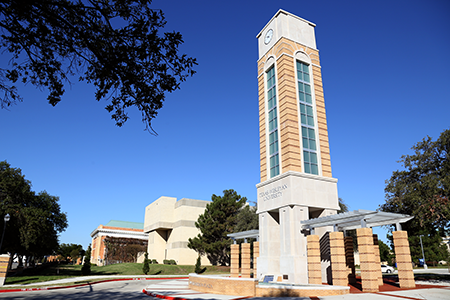Texas Wesleyan welcomes author Sarah Towle
.png)
Texas Wesleyan welcomes author Sarah Towle
Tuesday, October 8, 12:30 - 1:45 p.m.
in the Science Lecture Theatre
Sarah will discuss her book, Crossing the Line: Finding America in the Borderlands. Following her discussion, she will hold a Q&A session. This will be a wonderful opportunity for students and faculty to engage directly with the author.
Join professors Bruce Benz (Biology), Alison Simonds (Sociology), and Eddy Lynton (Criminal Justice) for a university-wide lecture about the immigration issue as presented in Crossing the Line.
Sarah Towle is an educator, researcher, and writer; a human rights defender, nature lover, and vocalist. She resides in an ephemeral borderland, buffeted and buoyed by a diversity of languages, cultures, landscapes, and creeds. She has taught English language literacy, cross-cultural communication, conflict resolution skills and the writing craft for three decades across four continents in myriad classroom contexts, including under the trees in refugee settings.
Sarah has earned accolades for her pioneering interactive place-based tales for educational tourism. Within one week of publication, Crossing the Line, her debut full-length book, joined the ranks of award-winning with a Gold Nonfiction Book Award from the Nonfiction Authors Association.
It was family separation and “kids in cages” that drove Sarah Towle to the US southern border. On discovering the many-headed hydra that is the US immigration system—and the heroic determination of those caught under its knee—she could never look away again. Crossing the Line: Finding America in the Borderlands charts Sarah’s journey from outrage to activism to abolition as she exposes, layer by “broken” layer, the global deterrence to detention to deportation complex that is failing everyone—save the profiteers and demagogues who benefit from it.
Deftly weaving together oral storytelling, history, and memoir, Sarah illustrates how the US has led the retreat from post-WWII commitments to protecting human rights. Yet within the web of normalized cruelty, she finds hope and inspiration in the extraordinary acts of ordinary people who prove, every day, there is a better way. By amplifying their voices and celebrating their efforts, Sarah reveals that we can welcome with dignity those most in need of safety and compassion. In unmasking the real root causes of the so-called “crisis” in human migration, she urges us to act before we travel much farther down our current course—one which history will not soon forgive, or forget.
More information can be found at https://sarahtowle.com/.








